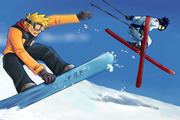So you dig sports but need some help with your game? Don't understand some of the rules of football, basketball or hockey? Got a gripe about PE class, skateboarders, cheerleading, coaches or anything? Why not Quiz the Coach?
Hey Coach,
I want to get more involved in sports and being active but the last time I tried I got hurt. I’m really scared of getting hurt. Do you have any advice for me?
lissylee
Hey lissylee,
It’s great to hear you’ve decided to get more active and involved in sports and other physical activities! Getting hurt is definitely a concern for active kids, but that shouldn’t stop you from getting out there, staying fit and having fun. There are lots of things you can do to help you stay injury-free and feeling great!
Protective Gear
Protective gear is worn on your body and keeps you from getting hurt. The kind of protective gear you wear depends on the sport you’re playing or the activity you’re engaged in. Helmets are a really common form of protective gear. They protect one of the most important parts of your body – your head – while you’re playing football, hockey, baseball, biking, skating and so many more! Always make sure you’re wearing the right helmet for your sport – for example, wearing a baseball helmet while you play football isn’t going to prevent you from getting hurt. Your helmet needs to fit you correctly – it should feel snug on your head but still comfortable. If the helmet has a strap, you must fasten it or it will fall off.
Other kinds of activities and sports require protective gear and padding for your eyes, teeth, wrists, elbows, knees, etc. And don’t forget about your feet. Certain sports like soccer, football, baseball and even golf use special shoes called cleats that have rubber or plastic points on the soles to help your feet grip the ground when you run around.
Make sure you wear all the necessary protective gear while you’re playing AND practicing.
Warming Up
It’s never a good idea to just run onto the field and start playing. Some people think you should stretch out your muscles before you start playing, but you actually need to warm up before you even start to do any stretches! A light jog or a couple quick laps around the field will help you warm up for play. Once you’re warmed up, stretch your body out by the side of the field or court to get ready. Warming up and stretching both help lengthen your muscles and increase blood flow and muscle temperature so your muscles are ready to go and less likely to get hurt.
Play By The Rules
Think of a busy intersection. A traffic light direct the vehicles and helps prevent crashes on the road. It works (most of the time) because drivers know the rules of the road and follow them. Well, it’s the same with sports.
Playing by the rules is the name of the game when it comes to having fun and preventing sports injuries. When all the players on the field know what’s allowed and what’s not, fewer of them get hurt. You know what to expect from the other people you’re playing with, and they know what to expect of you. For example, in hockey, you’re not allowed to use your stick against the body of another player to get the puck. But it’s OK – and safer – to go after the puck with your stick.
Look Out For Others
Some of the rules of sports have nothing to do with scoring points or getting penalties. Some of them are specifically put in place to protect the people playing. For example, in baseball, you can’t fling the bat after hitting the ball. You have to drop it so it doesn’t hit anyone. Same goes for diving. Divers must make sure the pool is clear before jumping off the board.
A good way to watch for others is to communicate when you’re on the field or playing a game. Next time you see a hockey game on TV, listen closely – behind the announcers and the roar of the crowd, you can hear the players talking to each other on the ice. Same goes for baseball – if an outfielder thinks he’s able to catch the pop fly, he’ll let his teammates know by yelling, “Got it!”
Listening to the coach, referees, umpires and other officials will also help keep you safe when you play.
Sick Leave
If you do happen to get hurt or injured, whatever you do, don’t get back into the game until you are fully healed! If you do, you risk causing yourself even greater injury, which could lead to some serious problems down the road. Be honest with your friends, teammates, parents and coaches if you get hurt. Most importantly, be honest with yourself! See a doctor if you need to and follow his or her advice about treatment, recovery and when it’s safe to start practicing and playing again.
Do you need tips or advice on sports, fitness or health? Send it to the Kidzworld Coach. Keep in mind, the Kidzworld Coach isn't a doctor or a professional athlete or anything like that. He's just a dude who digs sports, plays and knows a lot about 'em. You should always talk to your parents, a doctor or your school gym teacher before starting a new sport or a new exercise.
Related Stories:






























